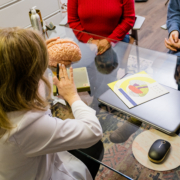What is normal cognitive aging?
Neuropsychologists are often asked: How does one know if lapses in memory are a sign of normal aging or something more concerning? Beginning around age 26, our mental abilities slowly start to decline. As we enter middle-age (early to mid-40s), we start to experience more noticeable changes, such as slower reaction time and trouble finding certain words and names. As we become older, around the sixth decade in life, we also experience trouble ignoring distracting information, which can make focusing on certain tasks like reading in a noisy room and driving a bit more difficult.
These are all considered typical changes associated with getting older. However, when mental changes become more severe, such as experiencing problems remembering new information, getting lost in once-familiar places, or even experiencing social blunders or sudden personality changes, it may be a sign that requires you to visit a medical expert.
These types of changes can indicate a more serious problem such as mild cognitive impairment (MCI) or in some cases the earliest signs of dementia.
MCI stands for mild cognitive impairment and is a condition where people have memory problems beyond others their age. MCI is often a stage between normal aging and a more serious decline such as observed in dementia. In most cases, however, this decline does not affect their daily routine.
When the decline does start to affect daily routines (driving, cooking, shopping, and doing finances, for example), this can indicate that the person may be in the early stages of dementia. Dementia is a syndrome that is caused by an underlying disease, the most common of which is Alzheimer’s disease. Alzheimer’s disease is a progressive disorder that affects the brain and results in severe cognitive decline in learning, memory and other areas, that interferes with daily functioning.
If you are having trouble with your mental abilities and/or noticing interference with your daily routine, it is important to get screened and evaluated by a medical professional such as your primary care provider, a neurologist, or a neuropsychologist. It is critical to discuss your symptoms with your medical provider. They will conduct a variety of screening and tests that include:
- A detailed medical history of current medical and psychiatric problems and current medication. A history of medical disorders (including Alzheimer’s disease and other dementias) of family members will also be assessed.
- Physical exams (including checking blood pressure, heart, lungs, blood and urine tests) to determine whether the symptoms you are experiencing are due to a medical condition other than dementia such as a thyroid disorder, depression, medication side effects, amongst others.
- Cognitive testing, which will evaluate a range of mental abilities (including memory, problem solving, language) through pencil and paper-based or computerized tests. This is important to provide a baseline level of your current level of functioning. It also will help determine whether your abilities are typical, better, or worse than others at your age and education level.
- Neurological testing, which will evaluate sensory responses and speech.
If the problem appears that it could be related to dementia, the doctor will perform additional tests such as brain imaging/scans to rule out medical conditions other than dementia that may cause the experienced symptoms, such as stroke, severe brain injury, tumors. These scans will also be performed to see if there are high levels of biomarkers of Alzheimer’s disease (amyloid-beta).
Although not widely used in practice, doctors may also conduct other assessments such as:
- Genetic testing to see if you may have a gene known to be associated with higher risk of developing Alzheimer’s disease.
- Blood tests to examine levels of specific markers (tau, amyloid-beta) that are associated with Alzheimer’s-related changes in the brain.
It is important to get tested early if you are experiencing symptoms that you think might be related to early dementia. Early detection is the best way to begin early treatment that can delay progression of dementia symptoms.
This article has been factchecked. For more about that process, click here.









